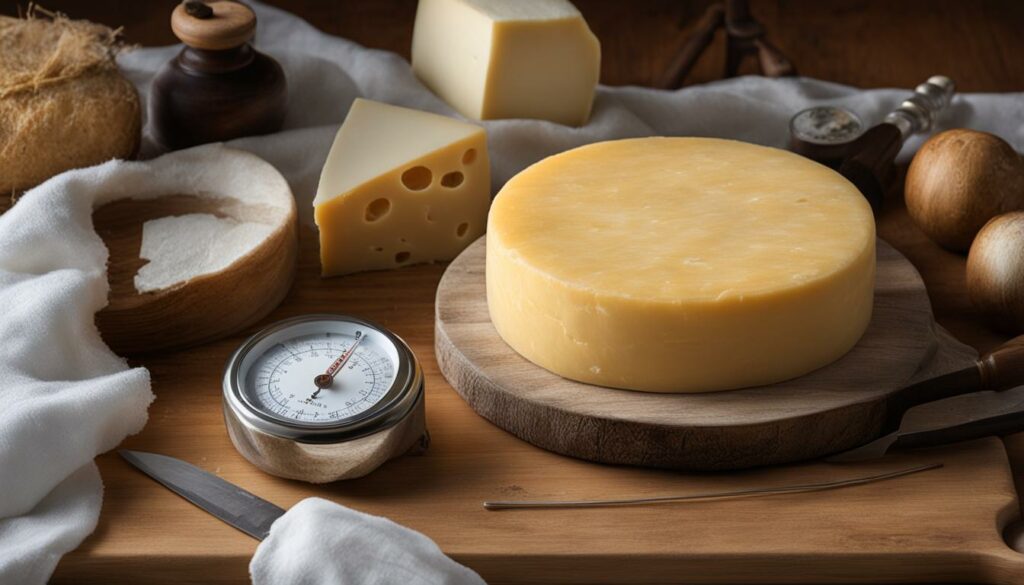Are you searching for the perfect cheese to complement your diet and enhance your overall wellness? Look no further! In this article, we will uncover the healthiest cheese choices that can satisfy your taste buds while providing numerous benefits for your body and mind. From understanding the nutritional value of cheese to exploring specific varieties with unique health benefits, we will guide you through the world of cheese to help you make informed decisions about what to include in your diet.
Understanding the Nutritional Value of Cheese
Cheese is not only a delicious dairy product but also a valuable source of essential nutrients. Understanding the nutritional value of cheese can help you make informed choices that contribute to a healthy and balanced diet. Let’s explore what makes cheese a healthy option, the role of milk types in cheese nutrition, and the impact of aging and processing on cheese quality and nutritional content.
What Makes Cheese a Healthy Option?
Cheese is rich in several nutrients that are essential for maintaining optimal health. It is an excellent source of protein, which is important for building and repairing tissues and supporting overall growth and development. Additionally, cheese provides essential vitamins and minerals such as calcium, vitamin A, vitamin B12, and zinc. These nutrients play vital roles in bone health, immune function, and energy metabolism.
Another notable component of cheese is its fat content. While cheese does contain saturated fat, consuming it in moderation can be part of a healthy diet. Some research suggests that the saturated fat in cheese does not have the same negative effects on cardiovascular health as previously believed. Additionally, the fat in cheese can contribute to feelings of satiety, helping you feel more satisfied after a meal.
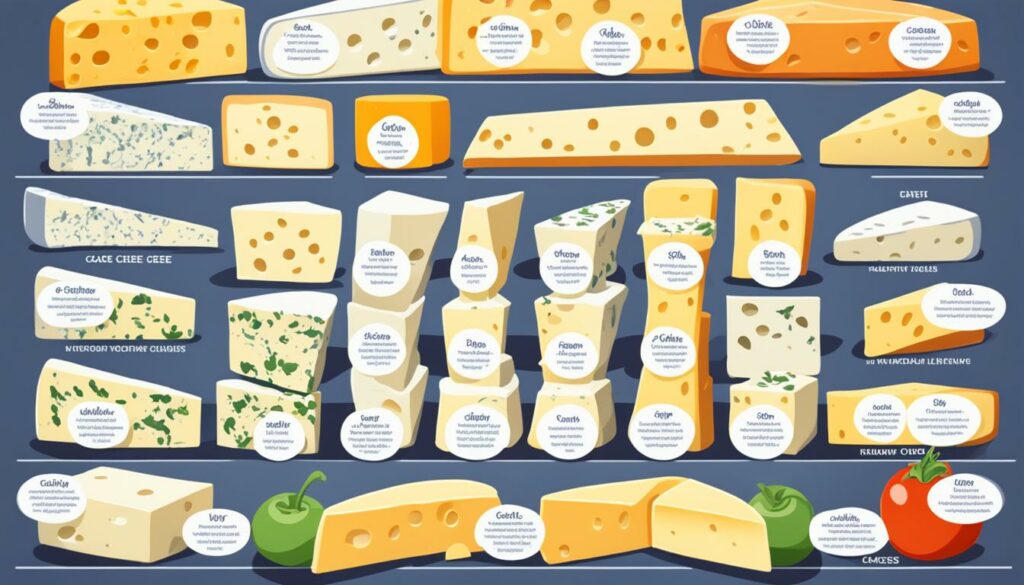
The Role of Milk Types in Cheese Nutrition
The type of milk used in cheese production can influence its nutritional composition and flavors. Different milk sources, such as cow, goat, or sheep, have distinct nutrient profiles that can vary in fat content, protein content, and vitamin and mineral content. For example, goat cheese tends to have less fat and cholesterol compared to cow’s milk cheese, making it a suitable option for individuals with specific dietary needs.
Additionally, milk from grass-fed animals can result in cheese with higher levels of omega-3 fatty acids, conjugated linoleic acid (CLA), and other beneficial nutrients. These compounds have been associated with various health benefits, including reduced inflammation and improved heart health.
Impact of Aging and Processing on Cheese Quality
The aging process and different processing techniques can significantly affect the quality and nutritional value of cheese. Aging allows flavors to develop and intensify while also impacting texture and composition. Longer aging periods often result in sharper and more complex flavors, while shorter aging periods produce milder cheese varieties.
Furthermore, the processing methods used in cheese production can influence its nutritional characteristics. Certain processing techniques, such as heat treatment or ultrafiltration, can influence the concentration of specific nutrients in cheese. For example, the heat treatment of milk during cheese production can affect the availability of certain vitamins and minerals in the final product.
It is important to note that cheese processing can also introduce additives or preservatives, which may impact the overall healthiness of the cheese. Opting for natural and minimally processed cheese varieties can help ensure that you are consuming a healthier product with fewer additives.
| Cheese Type | Nutritional Composition | Flavor Profile |
|---|---|---|
| Cow’s Milk Cheese | Higher in saturated fat, calcium, and vitamin B12 compared to other milk types. | Varies depending on aging and processing methods. |
| Goat Cheese | Lower in fat and cholesterol, higher in protein and calcium compared to cow’s milk cheese. | Milder and slightly tangy flavor. |
| Sheep Cheese | Higher in fat, protein, calcium, and vitamin B12 compared to cow’s milk cheese. | Rich and robust flavor. |
Discover the Healthiest Cheese Varieties
When it comes to choosing cheese for a healthy diet, there are plenty of options to explore. Each cheese variety has its own unique nutritional profile and health benefits. Whether you’re looking for a creamy delight or a protein powerhouse, there’s a cheese out there to suit your taste and dietary preferences. Here are some of the healthiest cheese varieties you should consider:
Remember to always consume cheese in moderation and as part of a balanced diet.
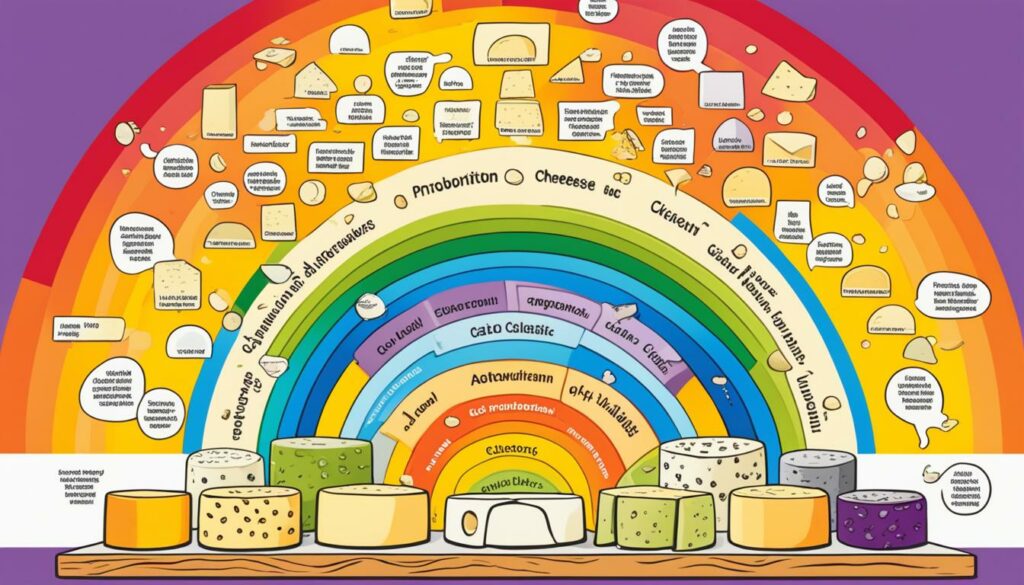
- Blue Cheese: Known for its bold flavor, blue cheese is packed with nutrients. It is a good source of calcium, protein, and vitamins A and K. Blue cheese also contains probiotics, which can promote a healthy gut.
- Goat Cheese: Goat cheese is lower in calories and fat compared to many other cheeses. It is rich in high-quality protein and provides essential nutrients such as calcium, phosphorus, and vitamin B12. Additionally, goat cheese is easier to digest for some individuals.
- Swiss Cheese: Swiss cheese is a great source of calcium and protein. It contains beneficial bacteria that can support gut health. Swiss cheese is also lower in sodium compared to other varieties, making it a suitable option for those watching their sodium intake.
- Mozzarella Cheese: Mozzarella cheese is known for its stretchy texture and mild flavor. It is a good source of calcium and protein. Mozzarella cheese is also relatively low in fat compared to other types, making it a healthier choice for individuals monitoring their fat intake.
- Cheddar Cheese: Cheddar cheese is rich in calcium and protein. It also contains vitamins A and B12. Opt for sharper cheddar varieties, as they pack more flavor with less consumption needed.
These are just a few examples of the healthiest cheese varieties available. Incorporating them into your diet can add deliciousness and important nutrients to your meals. However, it’s important to consider your individual needs and dietary goals when selecting cheese. Remember to consult with a healthcare professional or registered dietitian for personalized advice.
Finding the Right Balance: Cheese in Your Meal Plans
When it comes to incorporating cheese into a balanced meal plan, finding the right balance is key. Cheese can be a delicious addition to your diet, but it’s important to consume it in moderation and ensure it aligns with your overall dietary goals.
Portion sizes play a crucial role in maintaining a balanced diet. While cheese is a good source of nutrients, it’s also calorie-dense, so portion control is essential. Aim for moderate serving sizes to avoid excessive calorie intake. A general guideline is to stick to about 1-1.5 ounces of cheese per serving.
Additionally, consider the frequency of cheese consumption. While it’s tempting to indulge in cheese every day, it’s best to enjoy it in moderation. Incorporating cheese into your meal plans a few times a week allows you to savor its flavors without overdoing it.
Pairing cheese with other nutritious foods is another way to ensure a balanced meal. Opt for whole-grain crackers or bread, fresh fruits, and vegetables to create a well-rounded plate. Adding lean protein sources like grilled chicken or fish can further enhance the nutritional value of your meal.
By finding the right balance, you can enjoy the flavors and benefits of cheese while maintaining a balanced diet. Remember, moderation is key, and incorporating cheese into your meal plans should be part of an overall healthy eating plan.

Feta: A Low Calorie Cheese with Health Benefits
In this section, we will explore the nutritional profile of feta cheese and its role in weight management. Feta cheese is known for its unique flavor and versatility, making it a popular choice among cheese lovers who are conscious of their calorie intake. Let’s delve deeper into the health benefits of this delicious cheese.
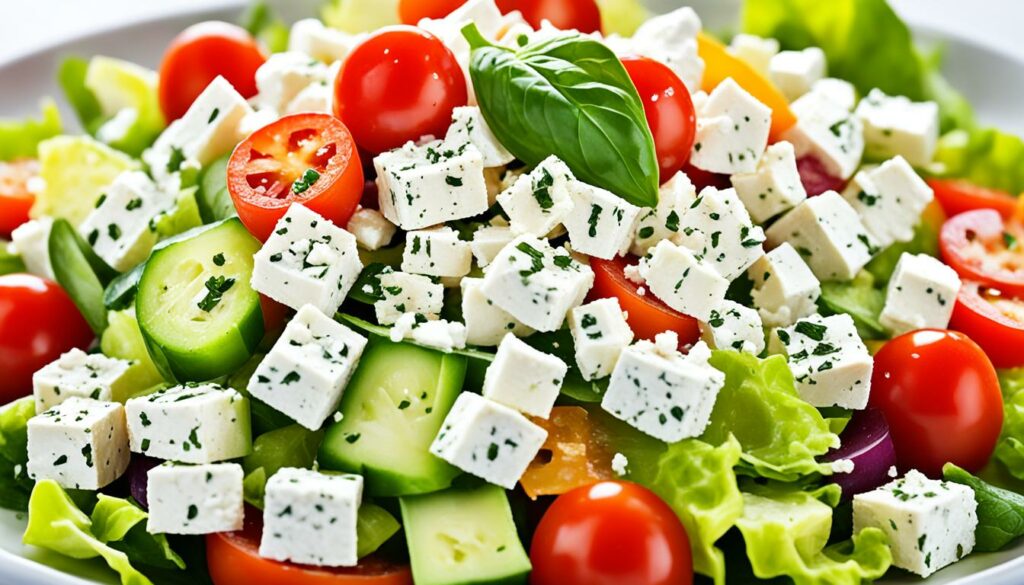
Feta’s Nutritional Profile and its Role in Weight Management
Feta cheese is a low-calorie cheese option that can be enjoyed without guilt. It contains fewer calories compared to many other types of cheese, making it an ideal choice for individuals who are watching their caloric intake while still wanting to indulge in the delight of cheese. With approximately 74 calories per ounce, feta cheese can be a satisfying addition to meals without significantly contributing to calorie overload.
Additionally, feta cheese is rich in protein, which plays a crucial role in weight management. Protein has a higher thermic effect, meaning it requires more energy to digest and can help boost metabolism. As a result, incorporating protein-rich foods like feta cheese into your meals can promote feelings of fullness and aid in weight loss or weight maintenance efforts.
Health Benefits of CLA in Feta Cheese
One notable health benefit of feta cheese is its potential role in weight management, thanks to its content of conjugated linoleic acid (CLA). CLA is a fatty acid found naturally in dairy products, including feta cheese. Research suggests that CLA may have positive effects on body composition by reducing body fat mass and preserving lean muscle mass.
In addition to its potential impact on weight management, CLA has been studied for its potential health benefits, such as reducing inflammation, enhancing immune function, and supporting cardiovascular health. While more research is needed to fully understand the extent of these benefits, the presence of CLA in feta cheese adds to its appeal as a health-conscious choice.
Next, we will explore another creamy delight – ricotta cheese. Discover the nutrients in ricotta, including whey protein and calcium, and how it can contribute to muscle growth and heart health.
The Creamy Delight: Health Benefits of Ricotta Cheese
Ricotta cheese, known for its creamy texture and delicate flavor, offers several health benefits that make it a valuable addition to a balanced diet. Packed with essential nutrients, including whey protein and calcium, ricotta cheese supports muscle growth and contributes to heart health.
Nutrients in Ricotta: Whey Protein and Calcium
Ricotta cheese is a rich source of whey protein, which plays a crucial role in muscle growth and repair. Whey protein contains all the essential amino acids needed for muscle development, making it an excellent choice for athletes and individuals looking to build lean muscle mass. Additionally, whey protein aids in maintaining a healthy metabolism and promoting satiety, which can support weight management goals.
Calcium is another key nutrient found in ricotta cheese. Calcium is essential for maintaining strong bones and teeth, and it also plays a vital role in muscle function, nerve transmission, and blood clotting. Including ricotta cheese in your diet can help meet your daily calcium needs and support overall bone health.
How Ricotta Cheese Supports Muscle Growth and Heart Health
The high whey protein content in ricotta cheese makes it an excellent option for individuals looking to increase muscle mass and strength. Whey protein is easily digested and absorbed by the body, allowing for quick delivery of amino acids to the muscles. This makes ricotta cheese an ideal post-workout snack or meal ingredient for muscle recovery and growth.
In addition to promoting muscle growth, ricotta cheese also contributes to heart health. The calcium in ricotta cheese helps regulate blood pressure, keep the heart rhythm steady, and support proper muscle contractions. Furthermore, research suggests that consuming calcium-rich foods, like ricotta cheese, as part of a balanced diet may reduce the risk of developing cardiovascular diseases.
With its combination of whey protein and calcium, ricotta cheese offers a multitude of health benefits, from supporting muscle growth and repair to promoting heart health. Including ricotta cheese in your meals and snacks can be a delicious way to optimize your overall well-being.

Cottage Cheese: A Protein Powerhouse for Weight Loss
When it comes to weight loss, cottage cheese proves to be an excellent choice. Packed with protein and low in calories, it is often referred to as a protein powerhouse, making it an invaluable asset for dieters in achieving their weight loss goals.
The high protein content of cottage cheese plays a crucial role in promoting weight loss. Protein is known to be more satiating than carbohydrates or fats, helping to reduce appetite and curb hunger cravings. By incorporating cottage cheese into your diet, you can increase feelings of fullness and satisfaction, making it easier to adhere to a calorie-controlled eating plan.
Not only is cottage cheese satisfying, but it also offers numerous benefits for dieters. With its impressive protein content, cottage cheese supports muscle maintenance and repair, allowing you to preserve lean muscle mass while losing weight. This is crucial as muscle mass plays a significant role in boosting metabolism and helping you burn more calories throughout the day.
Additionally, cottage cheese is a rich source of essential nutrients such as calcium, phosphorus, and B vitamins. These nutrients are vital for overall health and well-being, ensuring that your body functions optimally during the weight loss journey.
When indulging in cottage cheese for weight loss, it is important to choose low-fat or reduced-fat varieties to keep calorie intake in check. Pair cottage cheese with fresh fruits, vegetables, or whole grain crackers for a satisfying and nutritious snack or incorporate it into salads and healthy recipes to add a protein boost.
To reap the benefits of cottage cheese as a protein powerhouse for weight loss, it’s recommended to include it as part of a well-rounded, calorie-controlled diet. Combined with regular physical activity, cottage cheese can support your weight loss efforts and help you achieve your desired results.
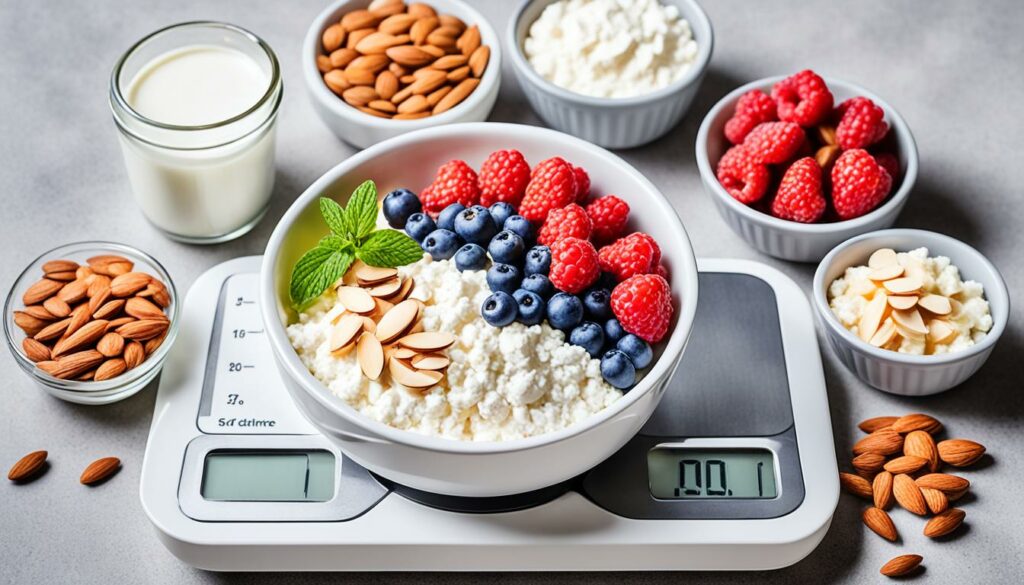
Gouda: A Health-Boosting Cheese with Vitamin K2
Gouda cheese is not only delicious but also offers several health-boosting benefits. One notable nutrient found in gouda is vitamin K2. Vitamin K2 plays a crucial role in promoting bone health, cardiovascular health, and various other health benefits.
By including gouda cheese in your diet, you can ensure that your body receives an adequate amount of vitamin K2. This nutrient helps regulate calcium metabolism, ensuring that calcium is properly utilized by the body for maintaining strong bones and teeth.
Moreover, vitamin K2 is also known to support cardiovascular health. It helps prevent the calcification of arteries, reducing the risk of heart disease. Additionally, vitamin K2 may have anti-inflammatory properties and can contribute to overall well-being.
When it comes to the nutritional profile, gouda cheese offers a good balance of protein and fat. It is also a rich source of calcium and vitamin B12, which are essential for various bodily functions.
Adding gouda cheese to your diet can be a delicious and nutritious way to support your bone health, cardiovascular health, and overall well-being.
Whether enjoyed on its own, melted over a sandwich, or incorporated into your favorite recipes, gouda cheese is a versatile and health-boosting choice.
Keep in mind that moderation is key when including gouda cheese in your diet, as it is still a high-calorie food. However, by combining it with other nutrient-dense ingredients, you can create balanced and flavorful meals that support your health goals.
Next, let’s explore the benefits of probiotic-rich cheeses, such as mozzarella, for gut health.
Benefits of Probiotic Rich Cheeses for Gut Health
Probiotic rich cheeses, such as mozzarella, offer a range of benefits for gut health. Probiotics are live microorganisms that, when consumed in adequate amounts, confer health benefits to the host. These beneficial bacteria can promote a healthy gut microbiome, aid in digestion, support immune function, and improve overall gut health.
When it comes to probiotic rich cheeses, mozzarella is a popular option. Made from cow’s milk, mozzarella undergoes a fermentation process that allows beneficial bacteria, such as Lactobacillus, to thrive. This fermentation process leads to the development of probiotics in the cheese, which can promote a healthy balance of gut bacteria.
Healthiest Cheese: The Best Choices for Your Wellness
This section provides a comprehensive summary of the healthiest cheese choices that promote overall wellness. These selections have been carefully curated based on their nutritional profile, health benefits, and taste.
When choosing the healthiest cheese options for your wellness goals, consider the following:
- Nutritional profile: Look for cheeses that are rich in essential nutrients such as protein, calcium, and vitamins.
- Health benefits: Opt for cheeses that offer specific health benefits, such as improved digestion, weight management, or heart health.
- Taste preferences: Choose cheeses that align with your taste preferences to ensure enjoyment while maintaining a healthy diet.
To help you make informed decisions, here are some of the healthiest cheese choices:
| Cheese | Health Benefits | Nutritional Profile |
|---|---|---|
| Feta | Supports weight management and provides high protein content | Low calorie and high in protein |
| Ricotta | Supports muscle growth and heart health | Rich in whey protein and calcium |
| Cottage Cheese | Powerhouse for weight loss and provides a satisfying option for dieters | High in protein and promotes a feeling of fullness |
| Gouda | Contributes to overall health with the presence of vitamin K2 | Provides vitamin K2 for bone and cardiovascular health |
| Mozzarella and other probiotic-rich cheeses | Promote gut health and support digestion and immunity | Contain beneficial probiotics for a healthy gut microbiome |
By including these healthiest cheese choices in your diet, you can enjoy the flavors and textures of cheese while supporting your wellness goals. Remember to consume cheese in moderation as part of a balanced diet.
Organic and Non-Processed Cheese: A Healthier Route
When it comes to choosing cheese options that promote better health, organic and non-processed varieties are the way to go. These healthier alternatives provide numerous benefits compared to their counterparts. Let’s explore why organic cheese is better for your health and the difference non-processed cheese makes in terms of nutritional value and overall well-being.
Why Organic Cheese Is Better for Your Health
Organic cheese, made from milk sourced from organically raised cows, offers a range of health benefits. One of the key advantages of organic cheese is its absence of synthetic additives such as hormones, antibiotics, and pesticides. These artificial substances are not present in organic farming practices, which helps ensure that the final product is free from potentially harmful chemicals.
Additionally, organic cheese tends to contain higher levels of essential nutrients compared to non-organic options. Since organic farming practices prioritize the health and well-being of animals and the environment, the resulting milk used to make organic cheese has higher nutritional content. This includes increased levels of omega-3 fatty acids, vitamin E, and antioxidants, which contribute to better overall health.
The Difference Non-Processed Cheese Makes
Non-processed cheese, also known as artisan or traditional cheese, undergoes minimal processing compared to its processed counterparts. This means that it retains more of its natural flavors, textures, and nutrients. Non-processed cheese is typically made using traditional methods that allow for the preservation of beneficial enzymes and bacteria, which can contribute to improved digestion and gut health.
Furthermore, non-processed cheese often has a higher content of beneficial microorganisms, such as probiotics, which support a healthy gut microbiome. These microorganisms have been linked to various health benefits, including improved immune function, better digestion, and enhanced nutrient absorption.
In summary, opting for organic and non-processed cheese provides a healthier route for those seeking optimal health benefits. Organic cheese offers the advantage of being free from synthetic additives and containing higher nutrient levels. Non-processed cheese, on the other hand, retains more natural flavors, textures, and beneficial microorganisms. Incorporating these healthier cheese options into your diet can contribute to improved overall health and well-being.
Low-Fat and Low-Sodium Cheese Choices for a Healthy Heart
When it comes to promoting a healthy heart, choosing the right cheese options can make a significant difference. By reducing your intake of saturated fat and sodium, you can support cardiovascular well-being and take proactive steps towards a healthier lifestyle.
Opting for low-fat cheese varieties can help you achieve your heart-healthy goals without compromising on taste or texture. These cheeses have lower levels of saturated fat, which is known to contribute to elevated cholesterol levels and increased risk of heart disease. Incorporating low-fat cheese into your diet can be a smart choice for maintaining a healthy heart.
In addition to watching your fat intake, it’s important to be mindful of sodium consumption. High levels of sodium can lead to high blood pressure, a risk factor for heart disease. By selecting low-sodium cheese options, you can enjoy the flavors and nutritional benefits of cheese while maintaining a heart-healthy lifestyle.
Did you know? A low-fat and low-sodium cheese can be the perfect addition to your heart-healthy diet, providing you with a tasty and nutritious option.
Here are some examples of low-fat and low-sodium cheese varieties that you can incorporate into your heart-healthy meal plans:
| Cheese Variety | Low-Fat Content | Low-Sodium Content |
|---|---|---|
| Feta | Lower fat content compared to other cheeses | Naturally lower in sodium |
| Part-Skim Mozzarella | Contains less fat than full-fat mozzarella | Lower sodium content compared to other cheeses |
| Low-Fat Cottage Cheese | Reduced fat content for a heart-healthy option | Naturally lower in sodium |
By incorporating these low-fat and low-sodium cheese options into your balanced diet, you can support your heart health while still enjoying the deliciousness of cheese. Remember to monitor your overall saturated fat and sodium intake from other sources as well to maintain optimal heart function.
Conclusion
Integrating Healthiest Cheese Choices into a Balanced Diet
Throughout this article, we have explored the world of cheese and its potential benefits for your overall health and wellness. Making the right cheese selections can play a significant role in supporting a balanced diet and optimizing your well-being. By incorporating the healthiest cheese choices into your daily meals, you can enjoy the delicious flavors of cheese while fueling your body with essential nutrients.
When it comes to integrating cheese into a balanced diet, it is important to consider your individual dietary needs and preferences. Whether you’re looking to manage your weight, support heart health, or promote gut health, there are cheese options that can align with your goals. From low-fat and low-sodium varieties to probiotic-rich options, the diverse range of cheeses available allows you to make informed selections that truly benefit your health.
Making Informed Cheese Selections for Optimal Health
As a cheese lover, you have the power to make choices that prioritize both taste and health. When selecting cheese, pay attention to its nutritional profile, including factors such as protein content, calcium levels, and the presence of beneficial vitamins or probiotics. Seek out organic and non-processed options to avoid synthetic additives and maximize nutritional quality.
While indulging in cheese, remember the importance of moderation and portion control. Keep in mind that variety is key, as different cheeses offer unique benefits. By diversifying your cheese choices and incorporating them into a well-rounded meal plan, you can optimize your health and wellness.
So go ahead and explore the world of cheese, making informed decisions that align with your wellness goals. Choose the healthiest cheese varieties for a balanced diet, and savor the flavors knowing that you are nourishing your body and enjoying optimal health.
FAQ
What makes cheese a healthy option?
Cheese is a healthy option because it contains essential nutrients such as protein, calcium, and vitamin D. These nutrients are beneficial for bone health, muscle growth, and overall well-being.
What role do different milk types play in cheese nutrition?
Different milk types in cheese nutrition can affect the taste, texture, and nutrient content of cheese. For example, goat cheese is lower in lactose and higher in certain vitamins and minerals compared to cow’s milk cheese.
How does aging and processing impact cheese quality?
Aging and processing can impact cheese quality by enhancing flavors and textures. However, excessive aging or processing may reduce the nutritional content of cheese. It is important to choose cheeses that are minimally processed for optimal health benefits.
What are the healthiest cheese varieties?
Some of the healthiest cheese varieties include feta, ricotta, cottage cheese, and gouda. These cheeses offer various nutritional benefits, such as low calorie content, high protein content, and the presence of vitamins and minerals.
How can I incorporate cheese into a balanced meal plan?
To incorporate cheese into a balanced meal plan, it is important to consider portion sizes and frequency of consumption. It is also beneficial to pair cheese with other nutritious foods, such as whole grains, fruits, and vegetables.
What are the nutritional benefits of feta cheese?
Feta cheese is low in calories and high in protein. It can support weight management and provide the potential benefits of conjugated linoleic acid (CLA), a fatty acid found in feta.
What nutrients are found in ricotta cheese and how do they support health?
Ricotta cheese is rich in whey protein and calcium, which are important for muscle growth and heart health. These nutrients can help in maintaining a healthy body and supporting overall well-being.
How can cottage cheese benefit weight loss?
Cottage cheese is a protein powerhouse that can contribute to feelings of fullness and satiety. Its high protein content makes it a valuable addition to weight loss diets, helping to support a healthy and satisfying eating plan.
What health benefits does gouda cheese offer?
Gouda cheese contains vitamin K2, which supports bone health, cardiovascular health, and other general health benefits. Its nutritional profile makes it a valuable addition to a balanced diet.
How do probiotic-rich cheeses like mozzarella support gut health?
Probiotic-rich cheeses, such as mozzarella, contain beneficial bacteria that can promote a healthy gut microbiome. These probiotics can aid digestion, boost immunity, and support overall gut health.
What are the best choices for the healthiest cheese?
The best choices for the healthiest cheese include feta, ricotta, cottage cheese, gouda, and other varieties that offer low calorie content, high protein content, and various health benefits.
Why is organic cheese considered better for health?
Organic cheese is considered better for health because it is made from milk that comes from organically raised cows, free from synthetic additives. Organic cheese also tends to have a higher nutrient content compared to conventionally produced cheese.
How does non-processed cheese differ from processed cheese?
Non-processed cheese is made using traditional methods and does not undergo extensive processing that can alter its nutritional value. On the other hand, processed cheese often contains additives and preservatives, which may reduce its overall health benefits.
What low-fat and low-sodium cheese choices are beneficial for a healthy heart?
Some low-fat and low-sodium cheese choices that are beneficial for a healthy heart include reduced-fat versions of cheddar, mozzarella, and Swiss cheese. These options can help reduce saturated fat and sodium intake, which can support cardiovascular health.
How can I integrate the healthiest cheese choices into my balanced diet?
To integrate the healthiest cheese choices into your balanced diet, it is important to consider portion sizes, frequency of consumption, and overall dietary goals. Incorporate these cheeses into a variety of meals and pair them with other nutritious foods for optimal health benefits.
How can I make informed cheese selections for optimal health?
To make informed cheese selections for optimal health, consider the nutritional profiles of different cheeses, including their calorie content, protein content, and specific health benefits. Choose cheeses that align with your dietary needs and preferences.





